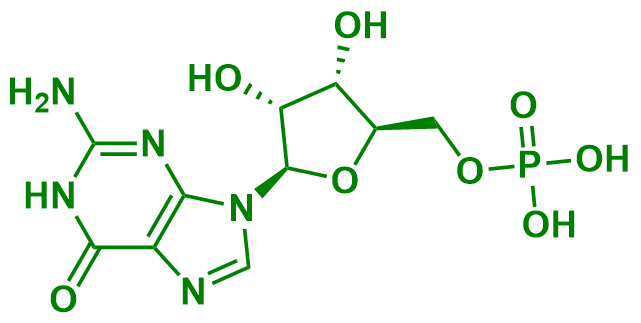GMP Analysis Service
- Uncovering novel disease biomarkers
- Improving disease diagnosis
- Accelerating the discovery of innovative therapeutic agents
- Providing new insights into disease mechanisms
- Animal tissue ≥ 100 mg
- Plant tissue ≥ 200 mg
- Serum/ Plasma ≥ 200 μL
- Urine ≥ 2 mL
Guanosine monophosphate (GMP) is a nitrogen-containing organic compound that belongs to the class of nucleotides, with the chemical formula C₁₀H₁₄N₅O₈P. GMP is composed of guanosine and a phosphate group. In RNA, guanosine pairs with cytosine (C) and adenine (A) to form base pairs. GMP is synthesized in living organisms through nucleotide metabolic pathways, primarily derived from the metabolism of guanine. It is present in various organisms, including bacteria, plants, and animals. As an essential component of RNA, GMP plays a crucial role in the storage and transmission of genetic information. It is also important in protein synthesis, gene expression regulation, and cellular metabolism. Additionally, GMP plays a significant role in cell division and growth.
The metabolism of GMP primarily involves phosphorylation and dephosphorylation reactions, converting it into guanosine triphosphate (GTP) and other nucleotide forms. These metabolites play important roles in RNA synthesis and signal transduction, participating in transcription and translation processes, influencing gene expression, and ensuring the accurate transmission of genetic information. GMP also contributes to cellular energy metabolism and signal regulation, modulating physiological functions. The content of GMP is closely related to plant growth and development. Analyzing its levels can reveal the physiological responses of plants under stress conditions, such as drought, salinity, and disease. By studying GMP and its metabolites, researchers can elucidate nucleotide synthesis and its roles in cellular metabolism, providing a foundation for understanding cellular functions and metabolic regulation.

Figure 1. The Structure of GMP
Mass spectrometry-based metabolomics methods can simultaneously detect and quantify thousands of metabolic features and are widely used for the metabolic analysis of various compounds. MtoZ Biolabs utilizes an LC-MS-based metabolomics research platform for the analysis of GMP. We ensure the accuracy of the quantification of GMP and its metabolites, as well as the comprehensiveness and precision of metabolite identification. If you would like to learn more about our GMP analysis services, please feel free to contact us, and we will be more than happy to assist you.
Analysis Workflow
Service Advantages
1. Experienced: MtoZ Biolabs has a professional research team and advanced technical equipment, capable of providing high-quality services and support to meet the specific needs of clients.
2. Wide Applicability: It is suitable for various types of samples, including plants, animals, and biological fluids, making it applicable across a broad range of fields.
3. High Throughput: Mass spectrometry technology can analyze multiple metabolites simultaneously in a short time, making it suitable for high-throughput analysis of large-scale samples.
4. Targeted Compounds: Targeted metabolomics focuses on specific metabolites, effectively eliminating interference signals and enhancing the reliability of the data.
5. Strong Detection Capability: Mass spectrometry technology can detect low concentrations of metabolites, making it suitable for analyzing rare or complex components in biological samples.
Applications
Sample Submission Requirements
1. Sample Types
Serum, plasma, urine, tissues, and other biological samples. A minimum of 3 samples under identical conditions is required for each type.
2. Sample Volume
3. Sample Preservation
Store at -80°C to ensure stability.
Note: Provide detailed information on sample collection and preparation.
Deliverables
1. Experimental Procedures
2. Relevant Liquid Chromatography and Mass Spectrometry Parameters
3. Detailed Information on GMP
4. Raw Data
5. Custom Analysis Report
Through our GMP analysis service, we strive to support your research and product development initiatives by delivering precise and trustworthy results.
How to order?







